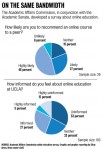Recently, the Daily Bruin published an article discussing the lack of initiative for online education.
During the 2013-2014 academic year, the Undergraduate Students Association Council Academic Affairs Commission established an online education advisory board aimed at facilitating discussion regarding how online education would impact the academic experience at UCLA. This board, comprised of students who applied to be part of the commission, developed an online survey, hosted focus groups and completed follow-up phone calls to gauge student interest in online education. All compiled data was presented to Academic Senate Chair Jan Reiff earlier this quarter. The commission is proud to present our findings made through dialogue and collaboration.
Survey findings confirmed many speculations from the Academic Affairs Commission. Ultimately, there is a significant interest in online education.
More than 70 percent of respondents who have taken an online course at UCLA were not only satisfied with their experience, but would also recommend the experience to a peer. Additionally, a majority of respondents who have not yet taken an online course through the university would consider doing so. This growing interest in online education should encourage committees in the Academic Senate to expand online courses offered, specifically for general education courses. Students surveyed preferred to satisfy general education courses online rather than courses needed for their majors or minors.
One might ask, after seeing such positive responses, what’s holding online education back from thriving at UCLA? Simply put, the major roadblock is a lack of knowledge. Only about one-third of students feel even somewhat informed about online education. The future of online education presents interesting options for hybrid courses, with in-person lectures and online discussions (a student favorite) or online lectures and in-person discussions (met with tepid response).
Developed by the Academic Affairs Committee Online Education Advisory Board and refined with feedback from Academic Senate leadership and the Registrar’s Office, an online education survey was open to the student body during weeks four through six of winter quarter. These questions garnered feedback from a variety of students, including transfer students and freshman students who have taken online courses at institutions other than UCLA.
To augment qualitative findings, the committee held focus groups and conducted phone interviews with those who expressed interest in continuing a dialogue on online education. Additionally, before the official data was released, the Academic Affairs Commission presented initial findings at the Teaching and Learning in a Digital Age conference alongside Vice Provost of Undergraduate Education Patricia Turner. These findings were presented to faculty from a variety of colleges across the UC system, including the UC Office of the President.
The Academic Affairs Commission has concluded that while students may recommend online courses to a peer, most students at UCLA are unaware and uninformed about online education. Additionally, students would prefer to take online courses for requirements not directly related to their majors or minors. The Academic Affairs Commission hopes that releasing this data to the student body serves as a first step in addressing online education and the transparency of efforts being made to continue development of online education at UCLA.
Ramalho is the USAC Academic Affairs commissioner. Christ and Nagy are directors of the Academic Affairs Commission Online Education Student Advisory Board.

If UCLA joins the MOOC effort, it will stand as one of the few public universities to offer a world-class education to all. Stanford and MIT is doing it, so why shouldn’t UCLA?